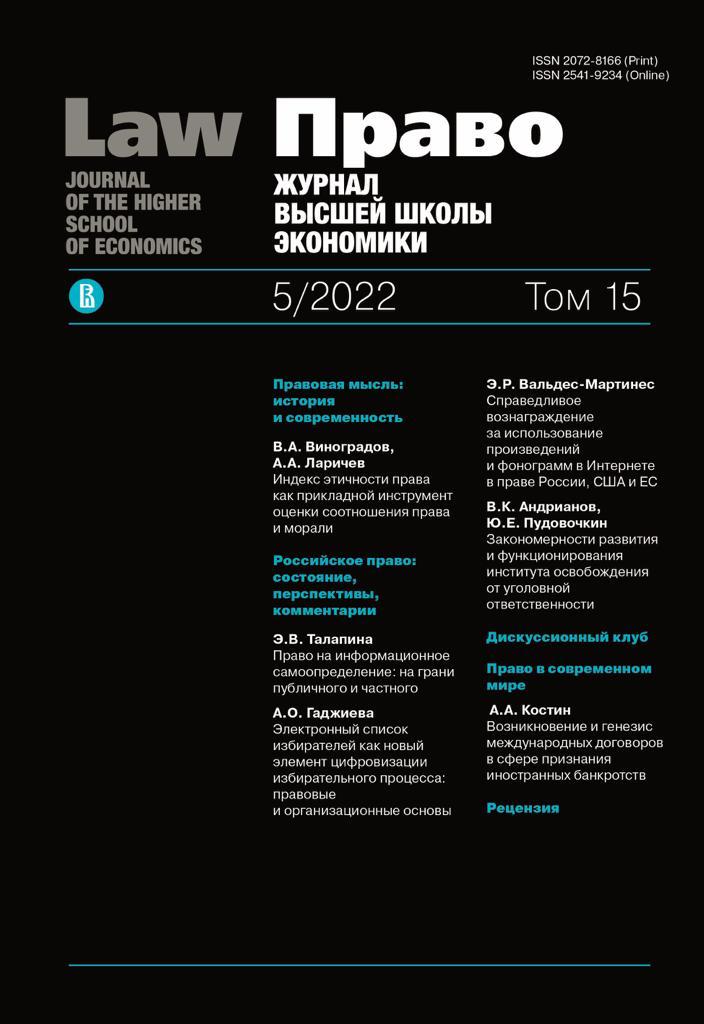Electronic Voters List as a New Element of Digitalizing Electoral Process: Legal and Organizational Basis
Abstract
The article studies the prerequisites for the implementation of electronic list of voters (ELV), legal regulation, the voting procedure considering the use of the ELV, enforcement of electoral rights during preparation and holding of elections, vote counting and further determination of elections results at a polling station. This article also deals with the first experience of the ELV use during Moscow municipal delegates elections. The introduction of the ELV made it possible to abandon the use of two different lists of voters during the same elections — the list of those who vote traditionally by visiting polling stations, and the list of those who vote remotely. The situation when there are two different lists of voters entailed significant difficulties both for electoral commissions and voters in realization of their electoral rights. With the introduction of electronic list of voters during municipal elections 2022 in Moscow, eligible registered voters did not have to submit in advance a remote voting request or to decide their method of voting (in person, remote, or electronic). Electronic list of voters excluded groundless deprivation of active electoral rights, what prior happened due to technical errors or normative casuistry. Integration of electronic list of voters eliminated any possibility of repeated voting by the same individual. The article concludes that in terms of the digitalization of the voting process the ELV becomes an effective mechanism for strengthening legal and organizational guarantees of the electoral rights of Russian citizens. This article also contains proposals for further improvements of voting procedures especially related to the ELV in terms of information and digital society development.
References
Alekseev R.A. (2020) Electoral system, electoral process and technologies. Moscow: MGOU, 136 p. (in Russ.)
Aranovskiy K.V., Knyazev S.D. (2016) Rule of law in correlation of sighs and meanings. Moscow: Prospekt, 208 p. (in Russ.)
Bandikyan M.D. (2021) Realizing suffrage by categories of citizens. Moscow: Prospekt, 160 p. (in Russ.)
Chistoborodov I.G. (2016) Regulation of electoral process in the Russian Federation. Moscow: Yuniti-Dana, 176 p. (in Russ.)
Filatova A.O. (2021) Publicity, openness and change for universal e-vote. Obrazovanie i pravo = Education and Law, no. 5, pp. 215-220 (in Russ.)
Fomin A.A. (2004) International electoral standards and the Russian federal legislation. Predstavitel'naya vlast': XXI vek = Legislative Power: 21th Age, no. 4, pp. 21-24 (in Russ.)
Ignatenko V.V. (2002) Liability and electoral process. Moscow: Center of Electoral Technologies, 165 p. (in Russ.)
Inalkaeva K.S. (2020) Issues of Russian electoral law. Saratov: University, 184 p. (in Russ.)
Koshel' A.S. (2018) Modern issues of forming State Duma, regional and municipal parliaments in Russia. Vestnik Tyumenskogo gosudarstvennogo universiteta = Bulletin of Tyumen University, no. 1, pp. 159-171 (in Russ.)
Leiba A.A. (2021) Regulation of distance e-vote in Russia. Grazhdanin i pravo = Citizen and Law, no. 1, pp. 16-25 (in Russ.)
Lopatin A.I. (2022) Digitalization of electoral process in Russia: legal aspects. Zhurnal rossiyskogo prava = Journal of Russian Law, no. 5, pp. 43-55 (in Russ.)
Popadeikin V.V. et al. (2021) Issues of electoral process. Moscow: Editus, 264 p. (in Russ.)
Reut D.A. (2018) Information as guarantee of suffrage in Russian Federation. Moscow: Prospekt, 160 p. (in Russ.)
Reut D.A. (2020) Digital democracy today. Izbiratel'noe zakonodatel'stvo i praktika = Electoral Legislation and Practice, no. 3, pp. 10-14 (in Russ.)
Rodionova M.E. et al. (2018) Electoral process in Russia and Europe: new practice, institutions and technologies. Moscow: KnoRus, 344 pp. (in Russ.)
Sintcov G.V. (2016) Constitutional guarantees of suffrage in the Russian Federation. Grazhdanin i pravo = Citizen and Law, no. 3, pp. 92-95 (in Russ.)
Tihomirov M.Yu. et al. (1997) Juridical encyclopedia. Moscow: Jurinformcentre, 525 p. (in Russ.)
Trykanova S.A., Kuleshova N.N. (2021) Digital technologies in electoral process. Moscow: Znanye, 70 p. (in Russ.)
Turishcheva N. Yu. (2021) Active suffrage: development of forms realization. Zhurnal rossiyskogo prava = Journal of Russian Law, no. 6, pp. 37-47 (in Russ.)
Veshnyakov A.A. et al. (2003) Commentary to Federal Law On guarantees of civil rights in referendums in Russia. Moscow: Norma, 896 p. (in Russ.)
Vinogradov V.A. (2022) The Russian constitutional law: textbook. Moscow: Eksmo, 752 p. (in Russ.)
Copyright (c) 2022 Law Journal of the Higher School of Economics

This work is licensed under a Creative Commons Attribution-ShareAlike 4.0 International License.


















